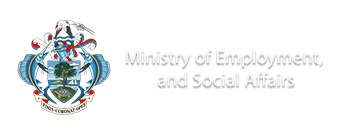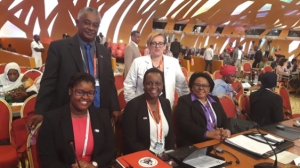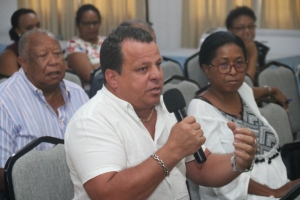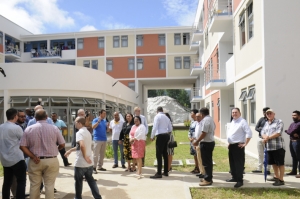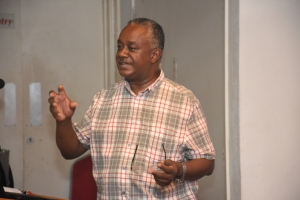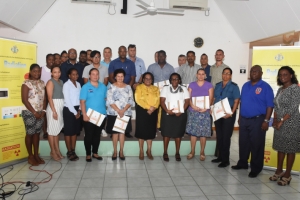Regulations seek to protect employees and public from radiation sources
Following cabinet’s approval for the adoption of the Radiation and Safety and Security Regulations 2019, principal secretary for employment, Jules Baker, has provided more information on the regulations and the new measures established by it to improve management of radiation-generating devices and equipment in Seychelles.
Radiation generating machines produce ionising radiation when in operation and can potentially present a radiation exposure hazard and lead to health problems.
Currently in Seychelles, radiation-generating equipment is used by the Ministry of Health, who operates x-ray machines, Magnetic Resonance Imaging (MRI) scan machines as well as ultrasound machines, as well as other private organisations such as dental clinics and others in the construction sector.
Since 2014, the government and National Assembly have taken steps to better manage such equipment through the implementation of the Radiation, Safety and Security Act, which makes provisions for the production, possession, use, import and exportation of radiation-generating equipment.
“There are certain equipment being used here in Seychelles which emit radiation and it is important that Seychelles, as a country, takes the necessary measures to better manage such equipment. After the law was enforced in 2014, it was necessary to introduce regulations on how the law will be implemented. For the time being, we have an inventory of all the equipment that emit radiation and we are working with the International Atomic Energy Agency (IAEA), who have supported us with the relevant information to deal with this,” PS Baker noted.
The employment ministry is the authority approved by IAEA and the government to administer the regulations, and as such, has established a section within the department to focus on enforcing the regulations and ensuring that licencees are compliant.
“As we develop, some mechanisms will have to be put in place. Firstly, as the competent authority, we have to issue licences to all agencies and organisations that use equipment with radiation generating devices. A procedure is in progress whereby, together with IAEA, that once the regulation is enforced, all the agencies will have to come to the ministry to declare what equipment they are using. If they satisfy the ministry that the equipment is instrumental to their operations, outline the risks that it carries and then the ministry will decide on whether to grant a license, and if not, the procedures to make their equipment compliant before they can be issued with a license,” he stated.
In order to be granted the license, the applicant must provide the department with documentation of their organisation’s internal system detailing the procedures for the use of such equipment.
The regulations also establish the maximum dosage limitation in the three circumstances in which persons are exposed to radiation, namely, occupational exposure where they are exposed through their jobs, medical exposure for patients undergoing tests, scans and treatments which produce ionising radiation and thirdly, exposure in the public domain. The limit for occupational exposure is at 20 millisievert.
The dosimeter can be worn by individual employees and read exposure levels daily. The device has to be tested by the Seychelles Bureau of Standards (SBS) monthly, as a means to ensure that employees are compliant and can take precautionary steps to avoid overexposure.
To facilitate the measurement and monitoring of exposure levels, the department has distributed 130 of 200 dosimeters donated by IAEA to organisations at which there are risks of exposure and overexposure to radiation. Personal dosimeters keep a cumulative record of the radiation dose received.
Persons who have been exposed and affected by radiation can seek a compensation remedy through a civil court case.
Asides from monitoring exposure levels, the department is also tasked with monitoring the transportation of such equipment, and when it is being decommissioned to avoid accidental exposure. As such, a Memorandum of Understanding (MoU) with customs in instances when such equipment arrive at ports of entry.
“From the information we have, the levels of radiation arising out of equipment currently being used in Seychelles is safe. We want to ensure that even if it is at a safe level, there are regulations in place to ensure that all organisations are not exposing members of the public and others to radioactive sources. It is very important for us as government to ensure that whoever is importing or using radioactive sources understand the risks associated with it,” PS Baker concluded.
Laura Pillay
Complements of Seychelles NATION
Address by Minister Myriam Telemaque at the 14th ILO African Regional Meeting, Abidjan, Cote d’Ivoire
The Minister for Employment, Immigration and Civil Status, Mrs Myriam Telemaque is heading a tripartite delegation from Seychelles at the 14th ILO Regional Meeting which is also commemorating its 60th anniversary in Africa and the ILO’s centenary, in Abidjan Cote d’Ivoire from 3rd to 6th December 2019.
On Wednesday 4th December, Minister Telemaque delivered her speech at the meeting stating that Seychelles, as a small African Island State, is optimistic for the future of work declared for the African continent, calling on Member States to adopt a human centered approach in everything that we do as we move forward to the next centenary. She acknowledged that Seychelles has its fair share of challenges with a small population that is ageing, but that despite of the many challenges it has managed to keep the unemployment rate low, through a number of targeted employment programmes particularly for the youth.
Minister Telemaque spoke about Seychelles’ commitments through its second Decent Work Country Programme that it launched in November 2018, as evidence that the country remains focused on creating a good future for its people. She spoke of significant efforts being made, as the champion of the Blue Economy in Africa, to protect our ocean while at the same time creating incentives to encourage the active participation of our people.
The Minister also took the opportunity of this meeting to advocate for the fate of small island states against climate change, stating that as a country we cannot afford to be complacent as our economy depends largely on our coastal areas that contribute a good percentage in our GDP. She mentioned of the different actions being taken such as the establishment of a national climate change council to better coordinate works being undertaken in this aspect at national and international level.
The other members of the Seychelles delegation attending are: Ms. Veronique Bresson; Special Advisor; Ms. Benilda Cupidon, Director General for Labour Migration; Secretary General of the Seychelles Federation of Workers’ Union, Mr. Antoine Robinson and Executive Secretary of the General Employers Trade Union of Seychelles, Mrs. Tina Hoarau.
Local employers voice out concerns over Bangladeshi labour agreement
Employers seeking to recruit Bangladeshi workers yesterday voiced their concerns regarding the new recruitment procedures, agreed by the government of Seychelles and the government of Bangladesh.
They did so in a stakeholders meeting organised by the department of Employment, under the Ministry of Employment, Immigration and Civil Status.
The new labour agreement, signed in October, follows the imposition of a moratorium on the recruitment of Bangladeshi workers last year and requires Seychellois employers to recruit workers through two approved government agencies in Bangladesh, namely the Bangladesh Overseas Employment and Services Limited (BOESL) and Bureau of Manpower Employment and Training (BMET), both of which were represented at the meeting yesterday.
As explained by the representatives of BOESL and BMET, employers seeking to recruit workers have to relay to the approved agency a letter of demand from the department of Employment, where they will then be required to sign a Power of Attorney document and other necessary documents.
The employer is also required to submit the Gainful Occupation Permit (GOP) for review by the agency, before the agency makes available the curriculum vitae’s of suitable candidates for selection by the employer themselves.
If the recruitment process is successful, a service charge applies, primarily to be borne by the employee, although employers are free to bear the cost at their own discretion.
It was further explained that an important component of the new procedure is a smart card, to be issued by the two agencies to Bangladeshi workers who are recruited and which contains all Biometric information of the worker.
Without the said smart card, workers will not be permitted entry into Seychelles, and risk immediate deportation.
Numerous local employers expressed dissatisfaction at the new procedures suggesting that it is overly complex for local employers and that the procedures are still unclear to them.
Pierre Quatre, a representative of the Seychelles Chamber of Commerce and Industry (SCCI), noted that he has tried to get into contact with one of the two approved agencies just a couple of weeks ago, and is yet to receive a response, leading him and others to question the agencies’ preparedness for the labour agreement.
“Since the new regulations were announced in October, local businessmen have tried to contact the two agencies and received no response, others have sent mails and not received replies which indicates that they were not ready to implement the system that the government of Seychelles has signed with the government of Bangladesh. There was a system whereby they requested some documents be sent to Bangladesh, but there are many difficulties that they are experiencing and there is total confusion. Therefore, I do not feel as if we are ready to implement the programme between the Bangladeshi government and the government of Seychelles,” Mr Quatre noted.
During the meet, the employers put forth numerous propositions including having a representative from the two agencies based in Seychelles, so the procedures and any arising issues can be solved through them.
“We proposed that a representative from the Bangladeshi recruiting agency be based in Seychelles so we can solve our issues directly through them. The government needs to reconsider this, through bilateral agreements to have a representative based in Seychelles. There are many, many issues and I do not understand why we are rushing the agreement. Let’s say for instance they vet someone but upon arrival the person cannot perform the said job, who will bear the cost?” he further questioned.
Other concerns revolved around the quality of workers, with many local employers seeking clarifications as to the guarantees and safeguards in place towards ensuring that the workers proposed by the agencies are indeed skilled and able to perform the duties required of them. Repatriation of workers in the event of death, was also a point of concern for many.
Director of labour migration at the department of Employment, Vanessa Dugasse, explained that all the procedures under the new agreement have now been finalised.
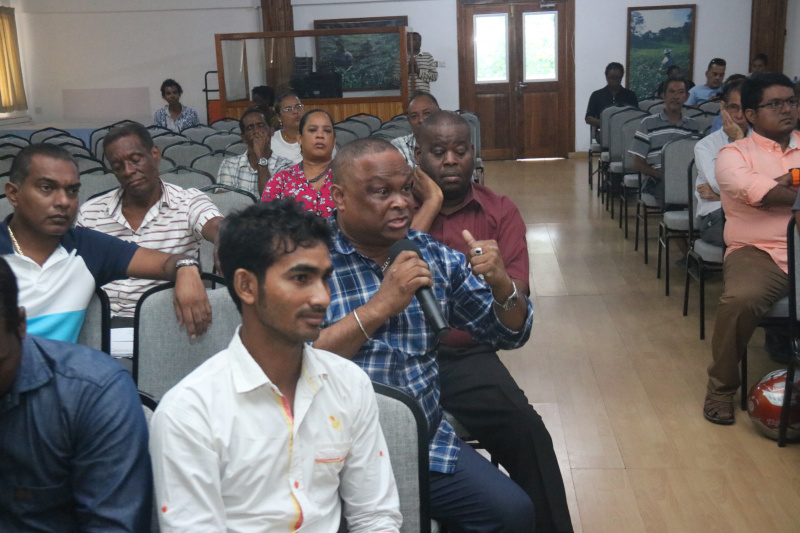
The meeting with the two agencies was initially scheduled for a later date, but had to be organised earlier on account of the number of complaints being raised by local employers and to finalise the final terms of the agreement.
“From now on, we expect things to get better. As with new rules and regulations, we expect a few hiccups here and there, but as the facilitator, we will intervene to sort out the issues as and when it arises,” she said.
“Some of the propositions which are being put forth now, we will act upon through negotiations between the government of Bangladesh and government of Seychelles, but some things will have to remain unchanged so as not to conflict with other laws,” Ms Dugasse noted.
The labour agreement aims to implement proper procedures for employment and repatriation of foreign workers, to protect their rights as well as prevent trafficking in persons and illegal employment of workers.
Stakeholders on Praslin will also have an opportunity to express theirs today, through a meeting being held at the Pension Fund Complex conference room from 9am to 12pm.
Laura Pillay
Complements of Seychelles NATION
Localization: A planned and necessarily well executed opportunity for growth
Decent work is about providing opportunities for productive work that delivers a fair income, security in the workplace and better prospects for personal development, amongst others. As we celebrate the World Day for Decent Work on 7th October, an initiative of international trade union (ITUC), let us take a moment to appreciate the efforts being made by exemplary companies to give all available opportunities to its workers to flourish and celebrate the achievements of our fellow Seychellois men and women under the Localization Programme.
Hotel L’archipel
An exemplary work establishment and hotel situated at Anse Volbert Praslin, boasting 70 % Seychellois workforce. Established since the year 1987, the hotel has most of its managers as Seychellois. It recently promoted 2 locals to the post of Sous-Chef and Restaurant Supervisor after following a development plan for two years. How do they do it? Let us hear from the General Manager, Mr. Lucas D’offay.
(1) D’offay, first of all our commendation for achieving a workforce of 70% Seychellois. Tell us how has this been possible for Hotel L’archipel, especially since you are based on Praslin where labour is even more scarce.
I am following in my father’s footsteps, who always believed in our Seychellois and wanted to have a hotel with 100% Seychellois. We all know it is not easy but we keep trying. We offer a good salary package with additional incentives, which does not necessarily have to be monetary. The presence of a strong welfare committee also helps, and being an almost all-Seychellois management hotel we understand our culture better so it gives us some advantage. We also do everything possible to recognize good performance. We do our part by welcoming students from secondary schools to work during school holidays to spark their interest and get them to join the industry, and why not Hotel L’Archipel, when they complete their studies.
(2) In your opinion would you say the localization programme is beneficial to the industry?
(A) Certainly, all of us wants to cut down on the number of GOP as it is costly. That is why the hotel embarks on programmes to work with the locals and where we see potentials we do our all to push them to occupy higher positions. Sometimes even we have candidates but they do not accept for different reasons such as working shifts.
(3) What advice would you offer to other organizations to encourage them to hire more Seychellois?
(A) I would encourage every establishment able to do so to embark on the programmes on offer like we have, and maybe look into the remuneration packages. We need to encourage our young people because at the end of the day they will be taking over.
(4) What are the challenges you encounter as a business in the recruitment of locals?
(A) The social ills are the main impediment. Secondly, delays encountered with government processes compounded by the fact that certain decisions are taken but not necessarily beneficial to the industry. There should be more communication and understanding of the industry.
(5) Any suggestion on how the localization programme could be improved to better suit your organization and the industry in general?
(A) One suggestion would be to introduce a sub programme targeting students by doing talks in the schools, to provide positive perception on the industry and encourage the young people to join. In hospitality a job is guaranteed so it is the place to be, really.
Meet the two Seychellois who got promoted under the localization programme
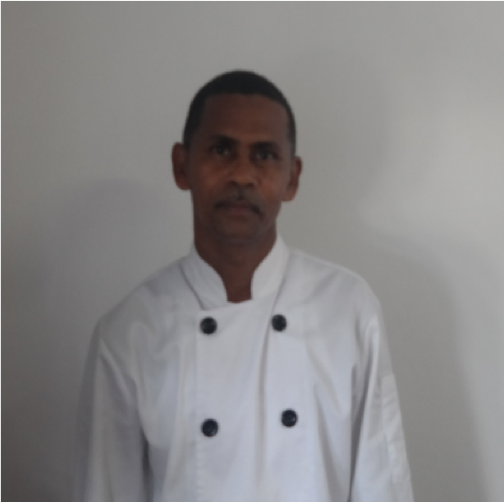
Name: Mr. Jeffrey Quatre
Establishment: Hotel L’archipel at Anse Governement on Praslin
Job title: Sous Chef
I have been in the tourism industry for many years, my career began as a Steward with Fisherman’s Cove Hotel. I got promoted to Head Steward with the same company. I left hospitality just before the hotel closed down for renovation and joined the Ministry of Agriculture. While I was there, a Chef recommended me to come to Hotel L’archipel, after some time I left and after 3 years came back until now.
I have learned a lot in the job, for now the Executive Chef is doing a lot of paperwork such as preparing the menu. I have my understanding of the process but just need to practice more and gain more experience with computer, which am getting a lot of support from management and the Executive Chef.
I have the same responsibility as the Executive Chef, because I am the only Sous-Chef, and now we have just recruited a new Junior Sous Chef which I am very happy to see our local taking up the job. In general, I do everything like requisition, oversee the kitchen and pastry daily operation.
I love being a Chef, I see it as very interesting and am passionate about it. The challenges every day are different but some of them are part of our daily routine which that we know how to deal with example, if a guest has special requirements we know how to organize and being creative to satisfy the guest’s needs.
During my localization stage I did all the course in all parts of the kitchen, I experienced a lot of difficult moments with staff and guests, but am proud to say that I have achieved a lot to be where I am today.
I encourage everyone to join and I always share my start in life with them so they can motivate themselves to be what they want to be. With very good behavior, they can be whoever they want to be.
In the future I want to be an Executive Chef and share my skills and knowledge with the youngsters. My aspiration is to see more Seychellois choose to work in the kitchen.
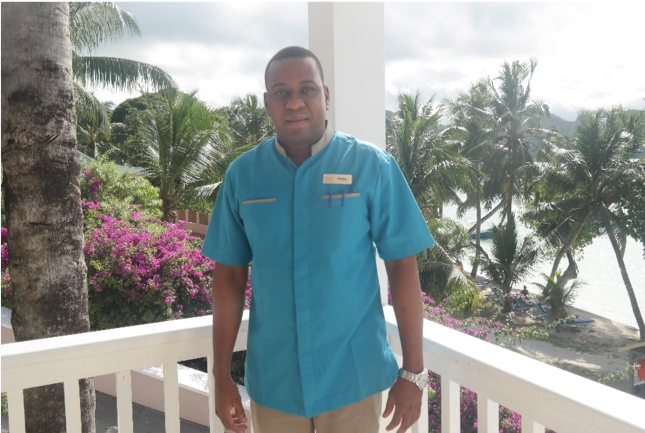
Name: Mr. Jovan Laira
Establishment: L’archipel Hotel at Anse Governement on Praslin
Job title: Restaurant Supervisor
I have been in the Tourism industry for nearly 16 years in a progressive career, that began as a gardener and after sometime I decided to change my path to F&B. I moved Senior Waiter, Maître d’hôtel and now am a Restaurant Supervisor.
As a restaurant Supervisor I am responsible for a team of 9 waiters and second in command after the Restaurant & Bar Assistant Manager. My job is very much challenging as having to lead a team of majority foreign workers of different nationalities, I have had to acquire the extra skills to understand and juggle the differences among the team. I meet different guests from all over the world every day, and I am now more directly involved with the clients to attend to their requests and complaints, but that also make my job more exciting as there is always something new to learn.
Localization is a good initiative to encourage and protect our local workforce. However, it is not always easy taking my case that I have not really learned much from being the understudy of the foreigner as he himself was still learning and I had more experience than him. But I did a training course in supervisory skills and that had helped me a lot in my present position.
I would encourage anybody going through this process to have patience, work hard, show willingness to learn and grow, accepting criticisms are all part of the process but at the end of the day it is well worth the sacrifice. I would also like to plead with our young generation to seize the opportunities laid down through the employment programmes as it is time that we take ownership of our tourism industry.
For my future I am aspiring to own my restaurant one day. Now all I have to do is learn the maximum to climb up the career ladder towards becoming an F&B Manager.
Paradise Sun Hotel
Situated at Anse Volbert Praslin, it has 64 % of its workforce as Seychellois. In operation for nearly 30 years, it is showing positive signs in the area of development and progression of Seychellois workers. It recently promoted 2 locals to the post of Sous-Chef and Restaurant Manager after following a development plan for some time. Mr. Ross Mackay, the General Manager, talks about what is driving the hotel to get this far.
(1) What is the key to retaining your employees and make them loyal to your establishment?
(A) I believe the key is to ensure your team’s happiness, motivation and enthusiasm when working. This can be done by working towards an environment that is based on communication, development and learning. Empowering people to make decisions, whether right or wrong, and learning from them, is important. We like to look at our team as the priority within the hotel, and try to make their work experience enjoyable.
(2) Do you find the localization programme relevant to the industry?
(A) Definitely, Seychelles has abundant talent and the people are naturally hospitable and welcoming. By having a localization plan in place, you allow people with potential to come to the forefront, which in turn puts them in a position to directly affect the business and industry in a positive way. The other aspect of the localization plan is the interest in growth development it creates in terms of other team members seeing that there is potential to move up within the hotel industry and better their chances of leading a fulfilling hotel career.
(3) What would be your advice to other organizations to encourage them to hire more Seychellois?
(A) My advice would simply be - take part in the localization programme. As hoteliers we have a duty to our teams to ensure their growth and development, which ultimately leads to a better and more productive hotel and industry. At our hotel we have dedicated our time to developing local leaders and the results have been outstanding. The localization programme offers a guided tool which assists in gaining the right results. I am glad that we have put every effort into this programme and I cannot speak highly enough about it.
(4) What advice would you offer to those who aspire to be successful in the industry?
(A) Be knowledgeable in the fact that the hospitality industry, like so many other industries, takes effort, dedication, passion and sacrifice. Nothing comes easy and success will not be gifted to you. There will always be challenges along the way, perseverance and patience are key. If an aspiring hotelier is willing to put in the hard yards and work towards their own goals and those of their company, then the rewards are endless.
(5) Any suggestions on how the localization programme could be improved to suit your organization and the industry in general?
(A) The Localization Programme itself is well organized and coordinated and there is not really much room for improvement. One area that could however be improved, is from grass root levels, whereby the youth are encouraged about the hospitality industry and are informed that there is a fantastic career opportunity within hotels. By doing this it will inevitably give hotels a larger pool of candidates to place on the Localization Programme. This should be the long term plan in terms of developing Seychellois hotel leaders.
Meet the two Seychellois who got promoted under the localization programme from Paradise Sun Hotel
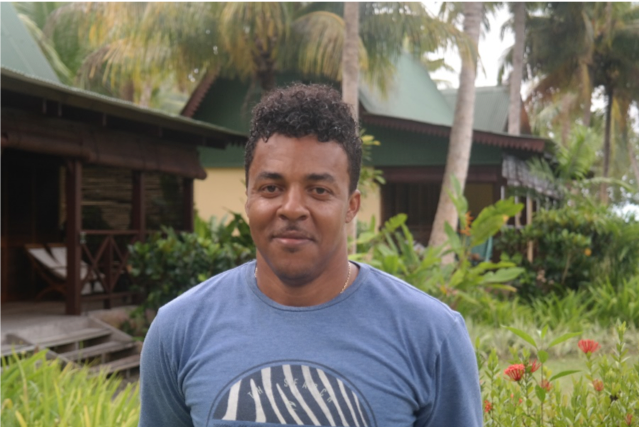
Name: Mr. Barry Malvina
Establishment: Paradise Sun Anse Volbert Praslin
Job Title: Sous Chef
My 20-year journey in the tourism industry began after my studies in Hotel school. I started in the kitchen with Ex Reef Hotel, then moved to Praslin where I worked at Berjaya Praslin Beach Hotel in the pastry section. After a while I decided to go back to Mahe where I worked at the Sunny Bakery. It was a good experience but not what I wanted. So when the opportunity strike through a friend I moved back to Praslin and ever since I have been with Paradise Sun for the past 18 years.
To be a Chef you need practical product knowledge, good with language and good in mathematics. I have been lucky to have the Executive Chef as my mentor. He has been and still is supportive. I have learned a lot from him. A lot of people are scared to take up new challenges. I did not let anything scare me off. I have been positive with the idea and told myself I will try and challenge myself to do it otherwise I will never know. And of course when getting a promotion, it comes with responsibility and with additional incentives.
It is exiting when you get good feedback from the guests, at the same time it is a challenge when they have high expectations. But most of all it is the comfort I have with my workplace where I get along with everyone. It is all about the job satisfaction in the end.
My advice to the young people who are thinking about joining the hospitality industry do not see working shift as a bad thing, do not let the working during weekends or public holidays stop you, because once you decide to join the industry there are sacrifices but in the end you will see the benefits because in hospitality there is a lot of prospect. Have confidence in what you do and commit to yourself. It is a give and take thing at the end of the day.
My future plan is to develop myself in learning how to deal with budgeting, learn more technical things that has to do with the job as I am thinking one day I can be an Executive Chef.

Name: Mr. Darrel Hetimier
Establishment: Paradise Sun Anse Volbert Praslin
Job Title: Restaurant Manager
I have been in the tourism industry now for 14years, it all started at the age of 15, and Paradise Sun is one of the establishments I did my internship in back in 2006. During the school year while giving us the choice of establishment I went to Ex Marechiaro Hotel at Baie Ste Anne Praslin. I remember very well they asked me to prepare a coffee/espresso, I did not know much about it but I did, and did not like the taste. Even with a few family members working in the hotel industry, most of them were in construction so the idea of becoming an Architect was always at the back of my mind. Still young I was not sure if joining this industry is what I really wanted to do because you do not always hear good things about working in hotels. But eventually I chose the industry until now I have not moved to any other field and year after year I grow to love my job.
Even if I started very young it took me years to really convince myself that this is what I really wanted until I was 21 or 22 years old. It took a turn when my F&B manager approached me and told me I have potentials with the very strong words ‘’you need to be a man and take your responsibility’’ which until today I am grateful. He was direct but ever since this is all I have done, be a man and took my responsibility. I saw a lot of situation as a step for growth. There were times I got discouraged as it was not easy. At the age of 24 I got promoted by the same F&B Manager to be a Bar Supervisor. Then I went to other establishments and kept within the area of food and beverage. I was approached by Paradise Sun 3 years ago to work as Assistant Restaurant Manager and it has been one year since I was asked if I want to be on the localization programme.
My daily responsibility is to ensure the smooth running of the operation we have 2 restaurants with 24 staff. Regardless if you have staff or not you need to make sure the operation still goes on and the guests are happy. My role is also to make sure the staff are happy so they can deliver. There are times also I oversee the whole hotel operations as Duty Manager, and besides being on the field I also have administrative duties where I have to make sure we have enough equipment, stock, etc… The key is to pre-plan everything from roster, budgeting, dealing with international suppliers.
The learning process never ends, there are always new products, new staff with different attitude, different guests with different nationality, different expectations but even with a lot of challenges we need to keep it exciting and make it interesting.
Having been in this industry for so long I can say that even without much skills or experience you can get far. Having a good attitude is key as having skills but without being a team player, not helpful, arrogant will not take you anywhere. What is important is willingness to listen and learn. Pay attention to details can make a differences and also prove your devotion you have for your job.
In the future I want to have my own business, maybe have my own restaurant, but will feel more complete if I can expand it to a small hotel of 5 rooms to start off.
END
CONTRIBUTED BY: Ministry of Employment, Immigration and Civil Status
Localisation Plan November 2019
The Ministry of Employment, Immigration and Civil Status is proud to present 10 dedicated well-deserved Seychellois men and women in their respective post and establishment through the localisation promoted programme in 2018 and 2019.
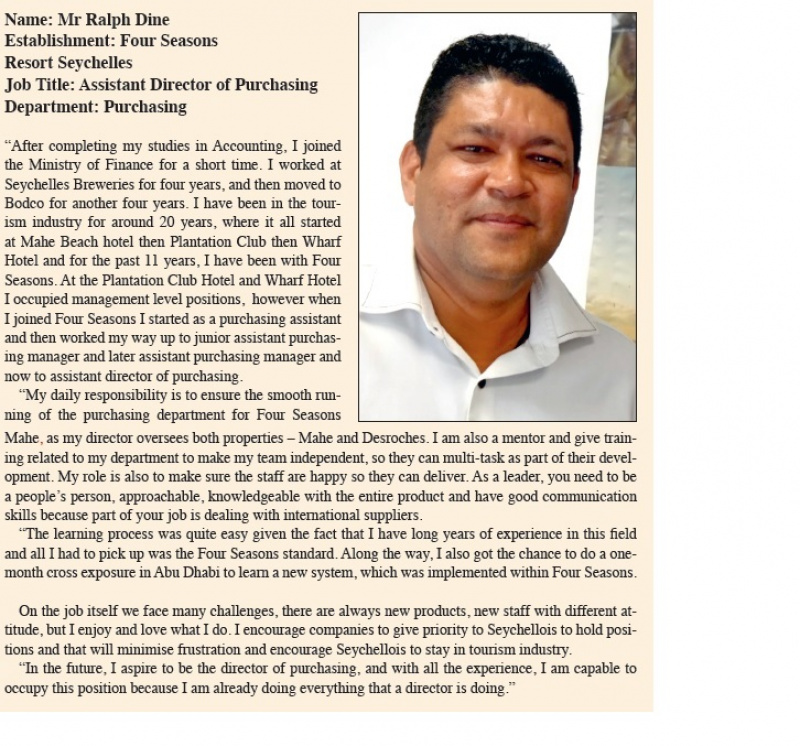
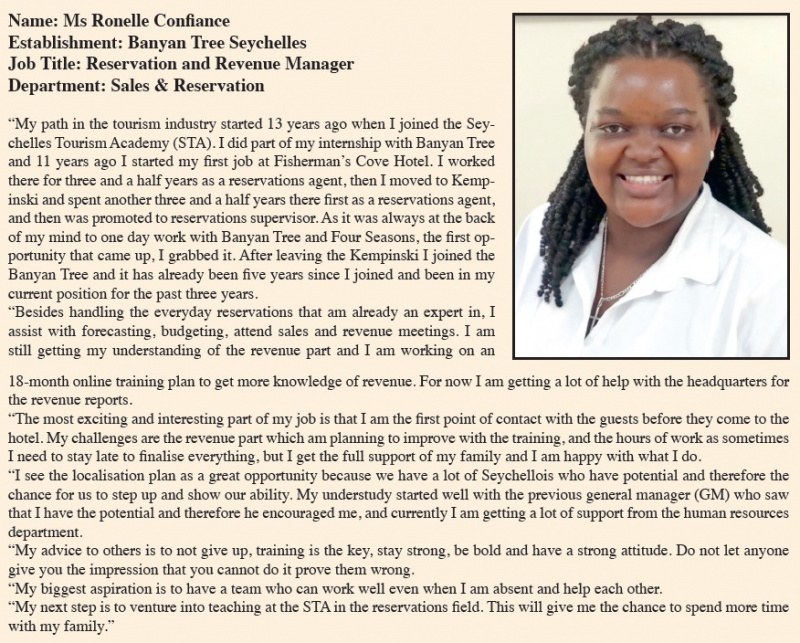
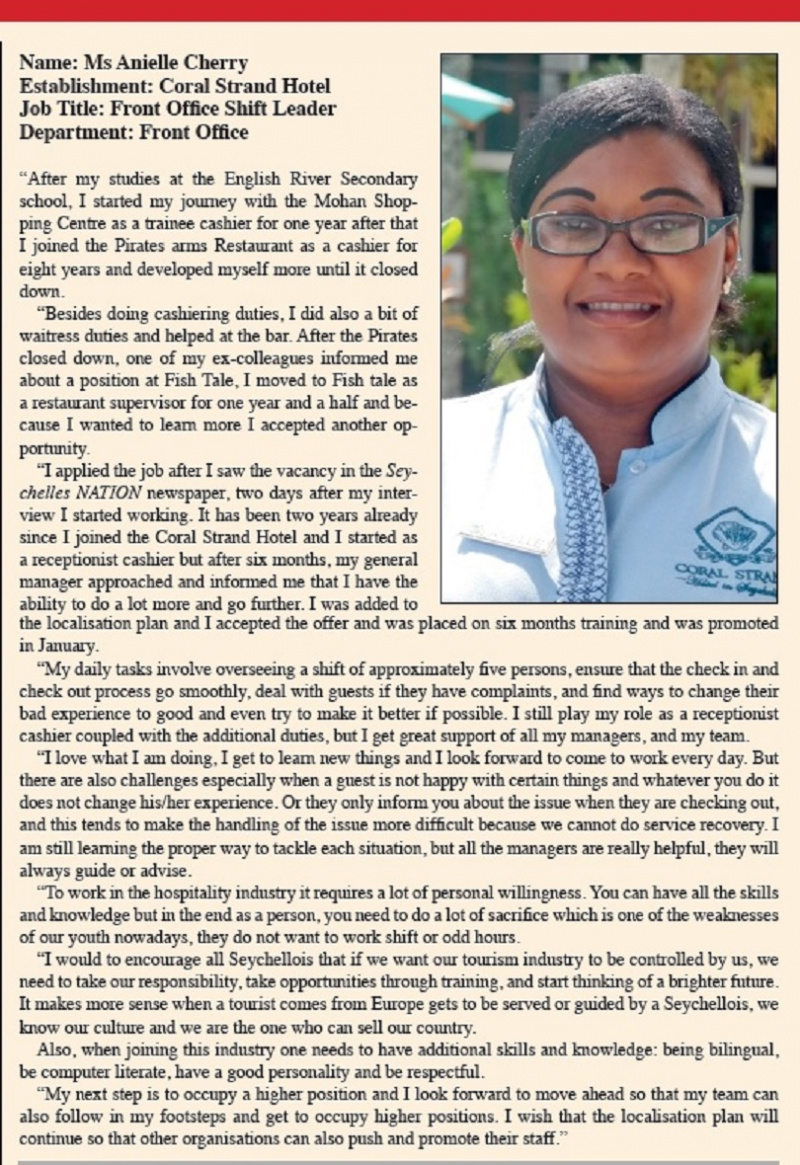
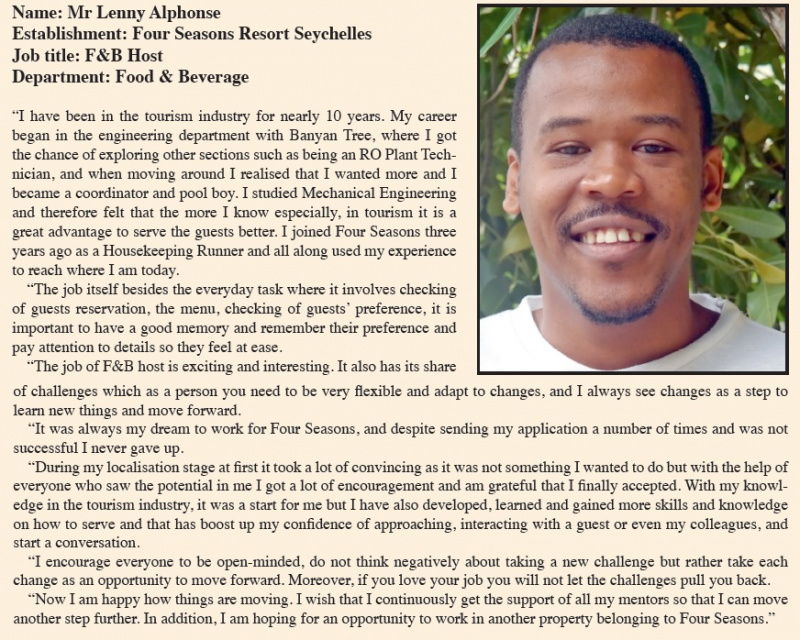
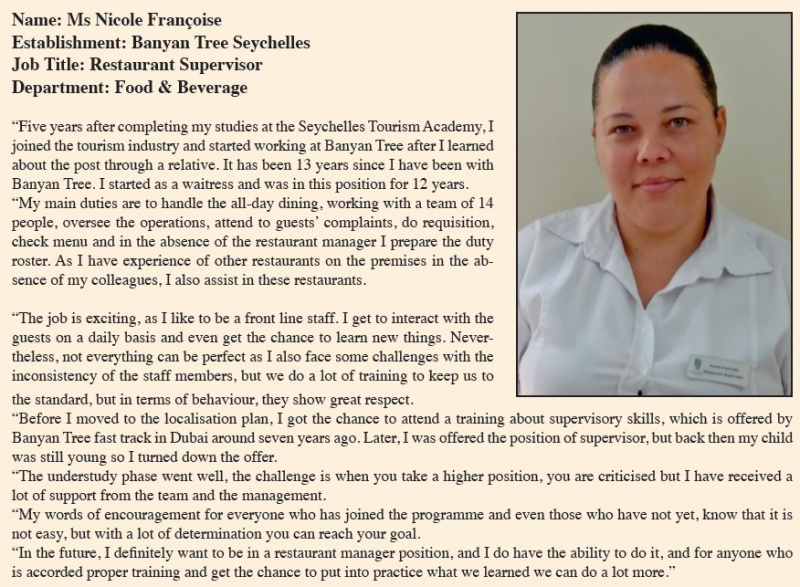
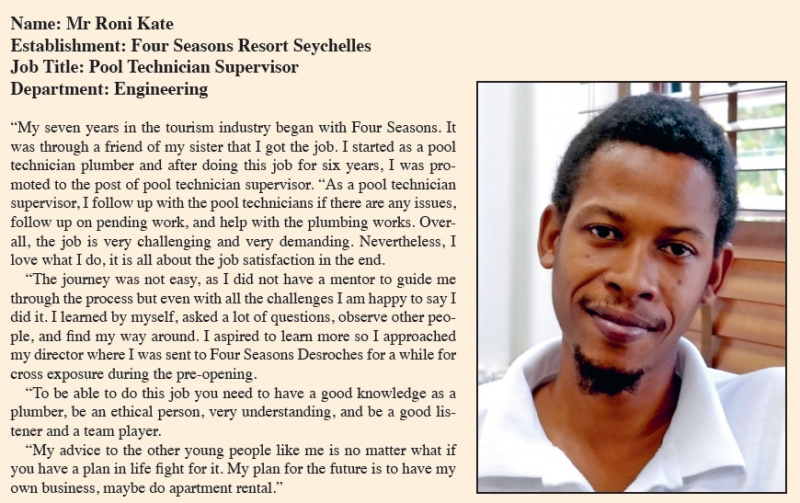
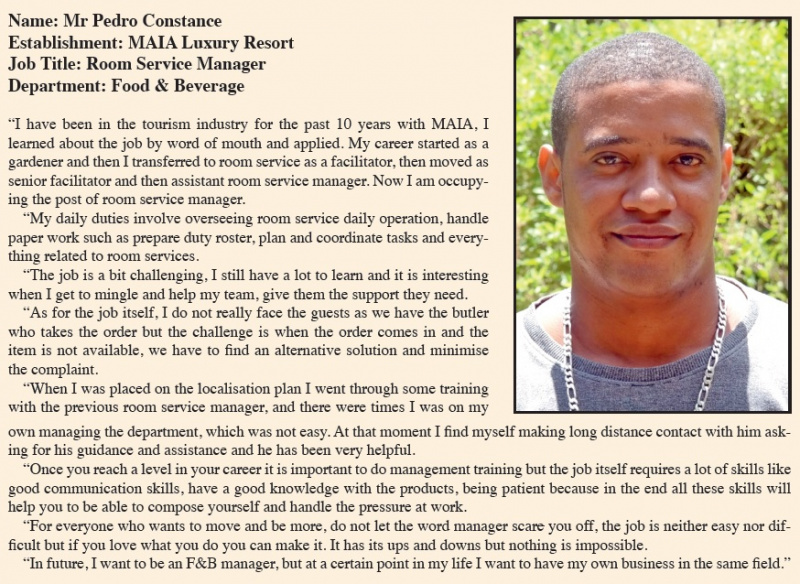


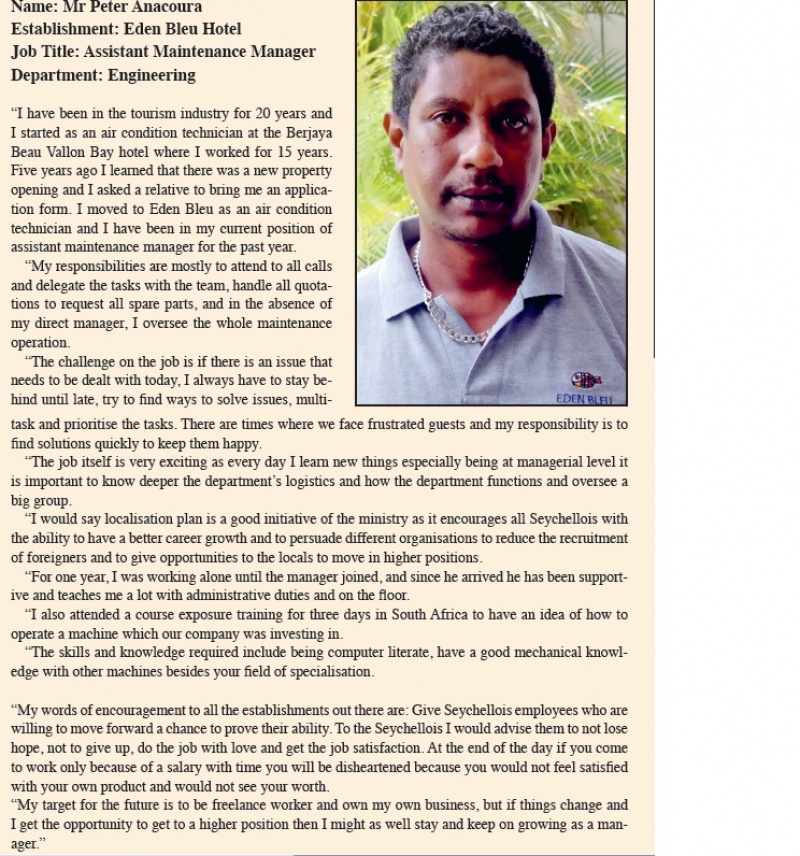
Complements of Seychelles NATION.
IOT opens residential building, inaugurates project CITADEL
Expatriate workers of the Indian Ocean Tuna will now benefit from their own residential building which officially opened its doors yesterday at lle du Port.
The 530-room apartment is already home to 430 employees who have already moved in. They include Malagasies, Filipinos, and Taiwanese among other nationalities.
In his opening remarks, Sven Massen, Thai Union Europe supply chain operations director, said the “hotel is a great investment of Thai Union”.
“Many of the houses that were leased by Indian Ocean Tuna (IOT) for its expatriate workers were in need of reparation and this project was discussed for a long time,” said Mr Massen.
He added that the building meets all ethical standards for housing including training room for workers. He noted that the apartment complex is also sustainable as it is equipped with solar panels.
As for Employment, Immigration and Civil Status Minister Myriam Télémaque, she said that IOT has come a long way since its opening and today it has a workforce of 1,433, it makes sense therefore for such an investment to ensure that the workers are in comfort while they are working in order to bring the company forward in its development.
“IOT serves as an example for all companies to follow suit so that they also can ensure that the welfare of their non-Seychellois workers is acceptable,” said Minister Télémaque.
She added that the ministry has made provisions in the new labour migration policy were it states that employers must identify conducive housing for migrant workers and the terms must be stated in the contract.
Yesterday also saw the opening of the IOT cold chain improvement tuna automated delivery extended layout or CITADEL at the IOT dock shipping port. The project includes the renewal of the seven cold rooms to improve their capacity, and to improve the way to receive fish.
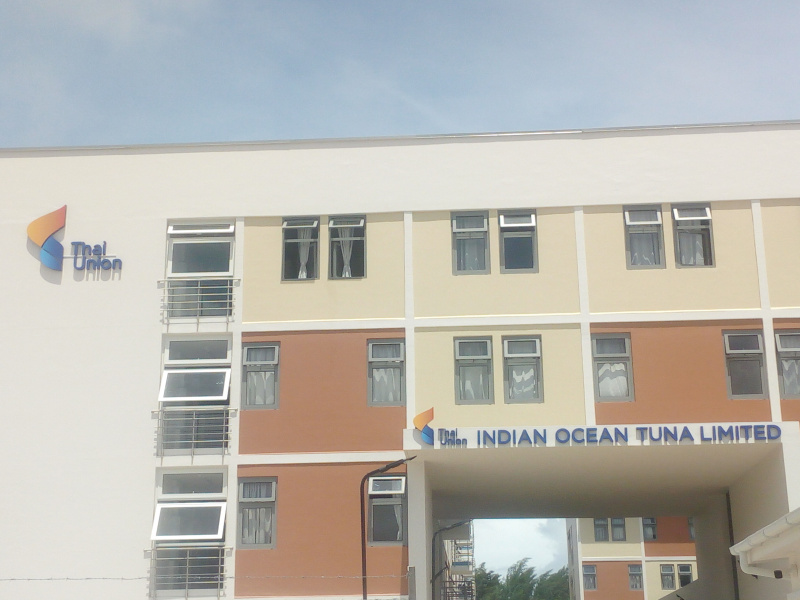
On his part, IOT general manager Nichol Elizabeth noted that both projects are big investments for Thai Union costing 16.5 million euros.
“We wanted to uphold a better standard of living for our workers as well as having them close to the factory,” said Mr Elizabeth.
He noted that the CITADEL project is the biggest investment that they have ever done in Seychelles costing 11.5 million euros.
“This project will help us make sure that IOT is always stable when it comes to fish by adding capacity and making sure that we unload fishing boats much faster,” Mr Elizabeth added.
Christophe Zialor
Assembly approves budget allocations for two more ministries
The National Assembly yesterday approved budget allocations for two ministries, namely the Ministry of Family Affairs and Ministry of Employment, Immigration and Civil Status.
Ministry of Family Affairs
- Benefits and approved programmes of Agency for Social Protection (ASP)
The budget for benefits and approved programmes offered by the Agency of Social Protection (ASP), under the Ministry of Family Affairs, was yesterday approved by 24 votes.
The agency, whose budget allocation amounts to R1.45 billion (1,457,787,000), is mandated with providing comprehensive social security services and social relief against vulnerability within the constitutional and legislative framework of Seychelles. The agency was yesterday represented by chief executive Marcus Simeon, as well as Minister for Family Affairs Mitcy Larue and principal secretary for poverty alleviation Alvin Laurence.
As explained by principal secretary for Finance Damien Thésée, under the Appropriation Bill 2020, the entity’s budget has increased by R100 million next year on account of increases in retirement benefits, invalidity and disability benefits as well as the announced increment in minimum wage, applying to home carers in this instance. Of the R100 million, R55 million is to be allocated towards retirement benefits which as announced by President Danny Faure will be raised from R5500 monthly to R5750 as from January 2020, R20 million towards invalidity and disability benefits which is also set to increase by R500 monthly and a further R23 million towards home carers to reflect the announced increase in minimum wage.
CEO Simeon explained that 75 percent, around R800 million, of the budget is for elderly care, R300 million for salary payments for home carers and a further sum of almost R200 million for disability benefits.
Numerous members of the assembly sought clarifications as to the programmes offered by ASP as well as the qualifying criteria for benefits provided by the agency, expressing concerns that a proportion of persons benefitting from welfare assistance are capable of working and earning a living.
It was noted several times that the World Bank is assisting Seychelles to revise benefits schemes and qualifying criteria among others to address the gaps in the current system. A report is expected to be produced followed by reforms within the agency and the services it offers.
The officials reminded the assembly of programmes such as the Unemployment Relief Scheme (URS) and others under the Department of Employment, which according to them has led to a reduction in welfare assistance from R80 million in 2017, to R55 million, and R47 million for 2020. They also highlighted and outlined some of the proposed reforms within the agency.
Among the announced reforms are changes to the home carers system. Minister Larue noted that cabinet has approved the proposal which includes training for home carers as well as a profiling system for persons requiring a home carer in a bid to make the system more efficient. The ministry and concerned agencies are currently holding consultations before the reforms can be finalised and implemented. She also announced that the agency is working in collaboration with La Reunion to build the skills and capacity of functionally limited persons so they can be less dependent on benefits and can participate in economic activities.
With regards to pension benefits, the assembly expressed concern over the qualifying criteria for retirees who have lived and worked away from Seychelles for significant periods and whether the retirement age will be pushed from 63 to 65 years.
Minister Larue stated that the proposal is not finalised, but was instead a recommendation in the ageing population policy.
- National Council for the Elderly (NEC)
The budget for the National Council for the Elderly (NEC) was yesterday approved by 25 votes.The budget allocation for the council amounts to R11.5 million (11,509,000) which is inclusive of R2.9 million for proposed expansions to elderly homes.
Minister Larue noted that the amount applies to 6 units to be built at the facility located at Anse Royale and work is expected to start during the first quarter of next year. The amount also applies to renovations to be carried out in kitchens and bathrooms of all existing 112 units, many of which have not been maintained properly over the years according to chief executive of NEC Marie-France Pereira.
Furthermore, three homes, namely Anse Royale, La Digue and Pointe Larue need urgent works on the sewage systems. Minister Larue noted that the Public Utilities Corporation (PUC) has submitted two reports for facilities on La Digue and Anse Royale. The ministry is awaiting the Pointe Larue report.
Members of the assembly questioned the panel as to minor increases such as under transportation and for rental. Ms Pereira noted that the council has over the past year recruited eight more employees, bringing the total to 10 and has established two more offices accounting for the increase in rental allocation.
According to Ms Pereira, there are 31 elderly citizens on the waiting list for a unit within elderly homes.
- Administrative Budgets under Ministry of Family Affairs
The administrative budget for the Ministry of Family Affairs amounting to R73,843,000 was approved by 17 votes.
Twenty-two members voted in favour of the R40,804,000 allocated towards administrative costs for ASP while the administrative budget for the National Council for Children for R14,810,000 was approved by 26 votes.
The administrative budgets for both the National Council for the Disabled amounting to R5,656,000, and the Social workers Council for a sum of R1,001,100 was also approved by the assembly.
Minister for Employment, Immigration and Civil Status
The Minister for Employment, Immigration and Civil Status Myriam Telemaque and special advisor Michel Marie appeared before the assembly yesterday afternoon to defend budget allocations under their ministry.
The budget for the Ministry of Employment, Immigration and Civil Status for a sum of R89,936,000 was approved by 15 votes yesterday afternoon. The amount is inclusive of an increment in the scheme for senior border officers from R3000 to R5000 in a bid to retain employees, on account of high turnover over recent years.
Minister Telemaque explained the processes for biometric passports noting an increase in the department’s budget for R16 million covering the process which involves Information Technology (IT) works by the department of Information, Communication and Technology (DICT), noting that it is expected to be ready by 2021.
The assembly will resume with its debates on the Appropriation Bill 2020 and is expected to debate on the budget allocations for the Seychelles Land Transport Authority (SLTA), Seychelles Tourism Board and the Anti-Corruption Commission.
Laura Pillay
Complements of Seychelles NATION
Employment ministry conducts refresher course in occupational safety on Praslin
The Ministry of Employment, Immigration and Civil Status (MEICS) conducted a series of activities in commemoration of Safety Week.
This included a basic refresher course in ‘occupational safety and health’ on Praslin, which saw the involvement of 25 organisations from both the public and private sectors.
The one-day training, which was held at the Pension Fund Complex in Grand Anse, was conducted by private consultant Russell Finesse. Health officers and human resource officers from various organisations were refreshed on the occupational health and safety legislation, hazard identification, risk assessment, accident investigation and reporting as well as safety inspections.
They were briefed on the importance of ensuring a safe and conducive working environment for their members of staff; most of which they were already aware of but which were sometimes being omitted.
The training session was described as very enriching by those who followed it and they vowed to better apply the knowledge acquired in their respective organisations as well as their everyday life.
On behalf of the director for outstation offices for the department of employment, Marionne Rose expressed the ministry’s appreciation of the turnout, adding that she hopes those who took part have enriched their knowledge and will then share with other work colleagues as we ensure a safe working environment in the workplaces.
The theme for this year’s safety week is ‘Safety and Health at the Heart of the Future of Work’and activities will be ongoing until next week.
Contributed by MEICS
Complements of Seychelles NATION
Championing the rights and responsibilities of workers
The Seychelles Federation of Workers Union (SFWU) organised a symposium yesterday, gathering the representatives of various institutions from the public and private sector to learn more about their rights and responsibilities.
This workshop forms part of a series of educational and sensitisation activities that the SFWU, together with its affiliated unions, organises for its committee representatives to better equip themselves with the necessary knowledge and tools to better understand the importance of the role of a trade union in workplaces.
Its main objectives are to create awareness on the importance of workers’ rights and protection as a Constitutional right and to understand the importance of the role of trade unions in defending workers rights and protection.
Antoine Robinson, the secretary general of the SFWU noted that without workers there is no trade union. For a trade union to exist the workers have to voluntarily be willing to join and become member of trade unions or workers’ organisations. Currently, the SFWU is presently formed by the membership of the Seychelles Transport and General Workers Union (STGWU) and the Teachers Medical and Professional Workers Union (TMPU). Both the STGWU and the SFWU unionise workers from the private, parastatal and public sector services.
“The SFWU came into existence in 1996 after the reintroduction of multi party democracy in Seychelles. The National Constitution of the Third Republic provides for the existence of independent unions to continue the translation of interests of workers into tangible perspectives.
“SFWU was created under the aegis of the Industrial Relations Act. 1993. We feel that the time is now as the work places are full of challenges in regards to employment and labour. Our labour laws are very progressive but still our workers feel that they are unfairly treated at times in regards to their rights and working conditions.
“There exist a lot of instances where employers violate labour legislations impacting on the working conditions of their workers, which create unnecessary frustration among the workforce impacting negatively on the working environment and productivity,” expressed Mr Robinson.
The secretary general stressed a lot on how to resolve violation and abuses through proper dialogue between the parties.
During the symposium, Ayda Aumeerudy from the Ministry of Employment talked about ‘Dispute Resolution Mechanism under Employment Act, 1998 & Public Service Order’ and Bernard Adonis from the Registrar of Trade Unions talked about the ‘Industrial Dispute Procedures under Industrial Relations Act. 1993.’
The symposium was quite animated by the various questions coming from the participants.
Vidya Gappy
Complements of Seychelles NATION
Companies with high radiation risks receive dosimeters
The Ministry of Employment, Immigration and Civil Status presented a number of companies each with a dosimeter yesterday at Care House.
The short ceremony was attended by Employment, Immigration and Civil Status Minister Myriam Telemaque and a number of representatives from various private and public companies.
A dosimeter is a device that indicates how much radiation is present in an area, this works by indicating medical professional or anyone working with equipment that emit radiation on how much they have been exposed to.
Tara Diallo, director for labour monitoring and compliance in the employment department, noted that in the ministry there is a section called the radiation protection unit that visits workplaces that have sources of radiation such as dental clinics, hospitals, Seychelles Civil Aviation Authority (SCAA) and so on.
“In our visit we have seen that there is a lack of a dosimeters in most of these areas and so we decided to make this donation today,” said Ms Diallo.
She added that the ministry is always one step ahead and is continuously monitoring workplaces that work with radiation.
She also remarked that officers are doing site visits every day and are taking the necessary precautions with employees that do not comply with regulations.
In total, 130 dosimeters were given out.
Christophe Zialor
Complements of Seychlelles NATION
